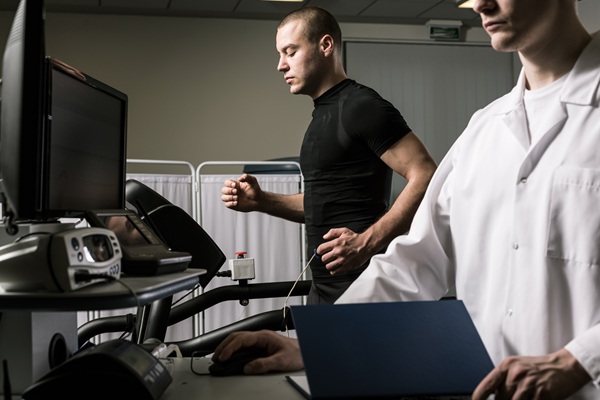When Is a Cardiac Stress Test Recommended?

A cardiac stress test is a diagnostic tool to evaluate how well the heart performs under physical stress. Cardiologists use this test to detect underlying cardiovascular conditions, monitor treatment progress, or assess the risk of future heart complications. Cardiac stress tests are essential in the early detection and management of heart disease.
Understanding cardiac stress tests
A cardiac stress test typically involves walking on a treadmill or pedaling a stationary bike while a cardiologist monitors the patient's heart rhythm, blood pressure, and breathing. In some cases, they may administer medication to mimic the effects of cardiovascular exercise for individuals unable to perform physical activity. The goal is to identify irregular blood flow to the heart or reveal symptoms that may not be evident while the heart is at its natural resting rate.
Common reasons that cardiologists recommend a cardiac stress test
Evaluation of chest pain or discomfort
Cardiologists often recommend a cardiac stress test to investigate chest pain, especially when related to potential heart issues. When a cardiologist suspects that the patient's chest pain may be related to their heart, the stress test is an essential diagnostic tool. It can help them determine if the pain results from ischemia, which reduces blood flow to the heart muscle and deprives it of oxygen.
Diagnosing coronary artery disease (CAD)
Coronary artery disease (CAD) occurs when the arteries that supply blood to the heart become narrowed or blocked. A cardiac stress test can help a cardiologist identify areas of restricted blood flow and determine how severe the CAD is. Early detection can prevent more severe cardiovascular events, such as heart attacks and strokes.
Monitoring heart disease treatment
Patients who are already diagnosed with heart disease may undergo periodic cardiac stress testing to monitor the effectiveness of their ongoing medical care. This includes evaluating how medications, lifestyle changes, or surgical interventions such as angioplasty or bypass surgery improve heart function. By analyzing these test results, the cardiologist can determine if the current treatment plan improves heart function, relieves symptoms, and enhances the patient's overall quality of life. Additionally, these assessments can help identify any new issues, such as reduced blood flow or functional limitations, allowing the cardiologist to promptly adjust the patient's treatment plan.
Risk assessment before surgery
Before undergoing major surgical procedures, especially those involving general anesthesia, the patient's medical provider may recommend a cardiac stress test. The goal is to assess whether their heart can handle the physical stress of surgery. This preventive diagnostic tool can minimize the risk of cardiac complications during or after the operation.
Identifying abnormal heart rhythms
Cardiologists may also use a cardiac stress test to detect abnormal heart rhythms known as arrhythmias. These are irregular heartbeats that can occur or worsen during physical activity. The test allows the cardiologist to observe how the heart responds to cardiovascular exertion and determine if further evaluation or treatment is necessary.
Call our office to schedule a cardiac stress test
A cardiac stress test is an essential diagnostic and monitoring tool in cardiology. It helps medical professionals assess heart function under stress and diagnose potential conditions, allowing them to make informed decisions regarding treatment and risk management. Do you need a cardiac stress test? Call our office to learn more or to schedule an appointment.
Request an appointment here: https://boyntonbeach.floridapremiercardio.com or call Florida Premier Cardiology at (561) 229-1411 for an appointment in our Boynton Beach office.
Check out what others are saying about our services on Yelp: Cardiac Stress Test in Boynton Beach, FL.
Recent Posts
Coronary stent placement is a treatment for coronary artery disease, a buildup of plaque (fat and cholesterol) around the heart's arteries. Along with angioplasty, a stent helps restore blood flow to the heart, relieving symptoms such as chest pain and shortness of breath and helping prevent a heart attack. The following overview of coronary stent…
Heart disease treatment encompasses a range of interventions, from lifestyle changes and medications to surgical interventions. Individuals can manage their condition and improve their quality of life by working with a cardiologist. Successful heart disease treatment starts with the patient having the information they need to make informed decisions about their health.Also known as cardiovascular…
A heart specialist is a doctor specializing in diagnosing and treating cardiovascular conditions. Patients may be referred to one of these doctors for several reasons, from diagnosing a heart health issue to getting cleared for surgery. However, seeing a heart specialist is even more crucial for those either experiencing the signs of heart disease or…
Cardiologists perform angioplasty to open blocked arteries, specifically those caused by coronary disease. This minimally invasive alternative to open heart surgery can restore proper blood flow to the heart and often reverse the fast track to a heart attack. However, learning when one is necessary is crucial for treatment success.Coronary artery disease (CAD) is a…


